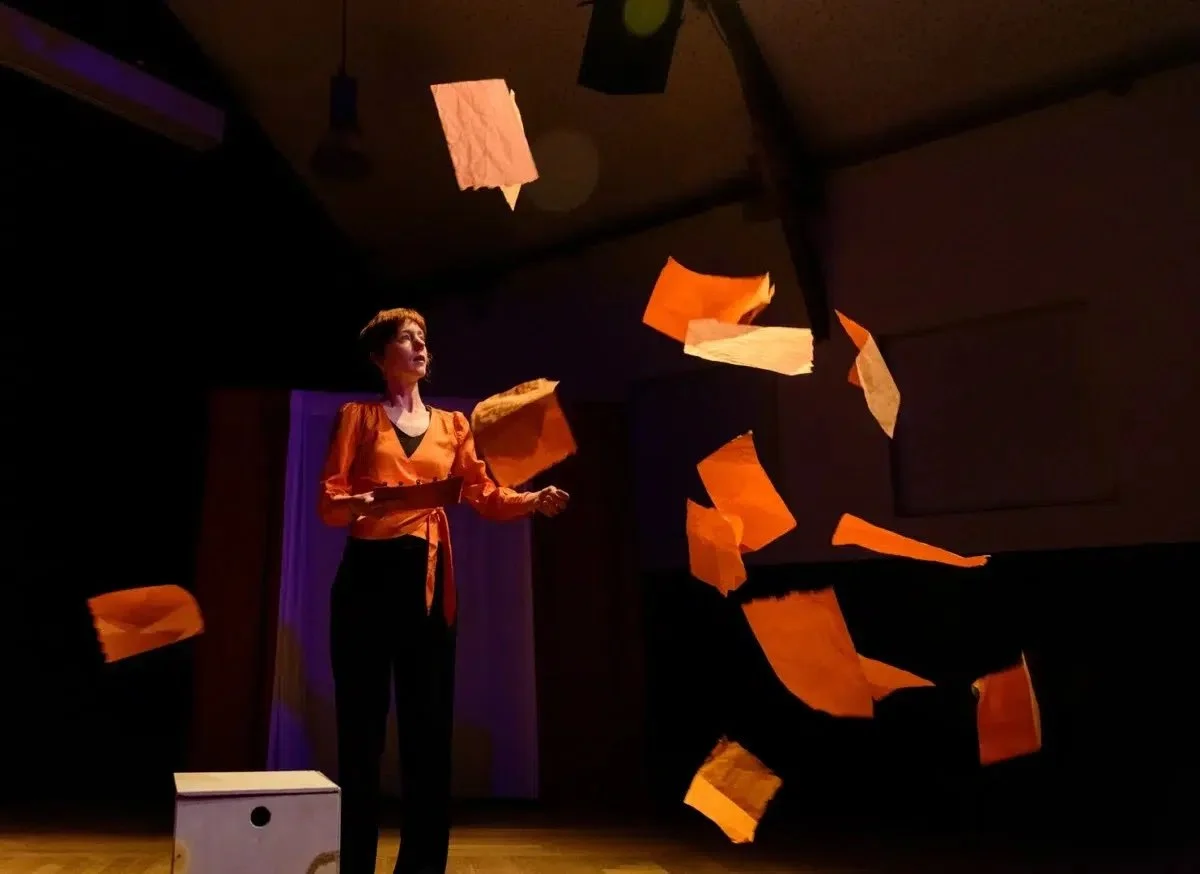Spencer Chandra Herbert sounds off on priorities as Minister of Tourism, Arts, Culture and Sport
“I know how important provincial support for the arts and culture world is,” the politician tells Stir
Spencer Chandra Herbert.
BEFORE SPENCER CHANDRA Herbert was a politician, first elected as the MLA for Vancouver-Burrard (now Vancouver-West End) in 2008 (the youngest MLA in the legislature), he was an artist. He spent time working with Judith Marcuse, the Vancouver TheatreSports League (now known as The Improv Centre), Neworld Theatre, and Leaky Heaven Circus. His newly appointed role as Minister of Tourism, Arts, Culture and Sport has been eagerly anticipated.
“It’s been a long-time dream,” Chandra Herbert tells Stir in a phone interview. “I’ve been following this file since before I was an MLA….I was in a Vancouver Opera performance of Norma and in Macbeth at the Playhouse Theatre as a child. It’s in the blood.” (His mother is Donna Spencer, artistic producer of the Firehall Arts Centre.)
“I think for me art allows me to see things in new ways,” he explains. “lt connects to the heart sometimes despite ourselves. It allows you to see people or to see issues for the first time in a way you may have never understood through a speech or reading a report. I’m so excited to continue to find ways to allow our communities to connect through the arts and to support artists and support the folks who support artists.
“I don’t know the last time B.C. has had a minister for the arts who’s come out of the arts—that was my life before politics,” he adds. “I don’t know that’s ever actually happened. It’s both an honour and also a real weight in the sense that I know how important provincial support for the arts and culture world is. It’s not the be-all and end-all, but to have that focus within government is really exciting.”
Given his background, Chandra Herbert knows first-hand what kinds of challenges are currently facing B.C. artists.
“I think certainly in many cases there’s the hangover effect of the COVID pandemic and ongoing concerns people have, whether that’s carrying extra debt, dealing with inflation, high interest, dealing with smaller audiences as people haven’t come back to the full extent that they used to attend for a variety of reasons,” Chandra Herbert says. “Just dealing with the reality of expenses… The government is not immune to that, either.
“In some ways I pinch myself because when I started as an MLA, I started calling for greater investments in the arts year after year after year,” he adds. “B.C. was always dead last in Canada [in terms of government funding]; we’re now number one or number two depending on which statistic you look at. It’s been quite an incredible change. I think the BC Arts Council at one point was at $10 million after major cuts under the former government and we’re now upwards of $40 million with a small capital fund, fairs and events funding, and major investments over the last three years. It’s been a bit of a sea change.”
The BC Coalition of Arts, Culture, and Heritage—a group of thousands of arts, culture, and heritage members in every region and more than 188 communities in B.C.—is advocating for the sector’s top three priorities, one of which is developing a provincial arts, culture, and heritage action plan. B.C. is the only province without a comprehensive strategy for its cultural sector. The coalition also wants to see an increase in the annual BC Arts Council budget to $55 million and the maintenance of COVID-era funding to the tune of approximately $34.5 million in annual resilience funding.
As for the call for a unified provincial action plan, Chandra Herbert says: “I’m certainly interested in the arguments for it. I think we have certainly done many things over the years to grow arts and culture, and it’s important to make sure we have alignment among our partners. With UNDRIP [United Nations Declaration on the Rights of Indigenous Peoples] we’d also want to ask how we can bring reconciliation into that. I’d be happy to look at that; we just want to make sure we have alignment across what we do.”
Chandra Herbert, who was an elected Vancouver Park Board commissioner from 2005 to 2008, says that the Province’s funding for the arts will be announced when the budget is released in March.
“I look forward to meeting with them [the coalition] and I’m always excited to hear from more advocates in the arts,” Chandra Herbert says. “I think there’s a strong case to be made about the value of B.C. government’s investment in the arts in terms of job creation, in terms of community health, and artistic expression. I think we look at the value these organizations bring in every corner of the province and you can see why people are so passionate and are inevitably calling for more support. We know the value of the arts.
“The challenges,” he continues, “as always, are we have so many needs in every field; there’s the need for more health care, there’s the need for more education. I think the arts of course play an important role in education and in health care. If we can express ourselves, see ourselves, and be connected in that way we are healthier for sure….The arts are important for jobs and they’re important for tourism, which is another part of the file. I’m excited to be an advocate for arts and culture within the B.C. government and abroad. These are some pretty tight times right now. The government has been hit hard as well financially, and we do need to find a path back to balance.”
Chandra Herbert sees the Vancouver Art Gallery’s decision to abandon its new design plans because of soaring costs as “a lesson for all of us”. “We have to manage within our means and at the same time make strategic investments as a government, as the art gallery did,” he says. “I think it was a wise choice. It’s obviously disappointing if you have to pull back this way, but at the same time you don’t want to get two-thirds of the way through and find out there’s no way to finish the project. We have to work within the means we have. There’s high demands all over the province, and I’m glad that they didn’t expect the Province to step in at the last minute and fund a massive overrun of debt.
“We recognize our partners have put up a lot to make this happen, and they’ve been hugely successful in fundraising as well, so the focus on getting it done rather than being stuck is good to see,” he adds. “I think that’s what the public wants: they want us to complete these things in a way that makes them more sustainable in the long run rather than creating future problems.”
Appointed in November, Chandra Herbert has dedicated some of his time in his new role to date focused on the film industry. In December, the government announced that, with the approval of budget legislation, the Film Incentive BC tax credit will increase from 35 percent to 36 percent, and the production services tax credit will increase from 28 percent to 36 percent for productions with principal photography starting January 1. To further give major productions incentives in the province, projects with B.C. production costs of greater than $200 million will receive a two-percent bonus.
“An immediate problem or challenge with the film industry is that there are a whole lot of qualified people—effective crews, performers, and studios—sitting idle right now around tax-competitive issues,” Chandra Herbert says. “Within a day and a half I was down in L.A. with the finance minister and the parliamentary secretary talking to the film industry there saying ‘Hey, we want you to come up to B.C.,’ and the announcement of changes to film tax credits is very good news for B.C. film artists.”
Another area of importance, Chandra Herbert says, is supporting Indigenous cultural access and looking at organizations like the Royal BC Museum to ensure it is “working appropriately with Indigenous communities and also improving the ability to share art history and culture in a respectful way for people of all sorts of diversities”. He says the Province will work with the First Peoples’ Cultural Council and aims to work toward reconciliation within the United Nations Declaration on the Rights of Indigenous Peoples.
When Chandra Herbert is not working, he spends time with his husband and seven-year-old son. They love getting out for walks and bike rides in the woods. He also enjoys reading, going to the theatre, and singing karaoke (“I’m a bit of a ham,” he says).
Chandra Herbert says he’s excited about working with the arts community and sees the arts as being a force that brings people together.
“In a world of disinformation and people attempting to pull us apart into rival camps, I think the arts play a role in community cohesion and being able to connect through differences rather than fighting differences,” Chandra Herbert says. “Nobody succeeds on their own, so the more we can support each other the more successful we will be.
“I’m still getting to know my own ministry and all the different departments; there’s quite a lot to it,” he says. “Some say it’s the ministry of fun and I agree, but it’s also a ministry of hard work. Sometimes people don’t get how much work goes into arts and culture.” ![]()

























